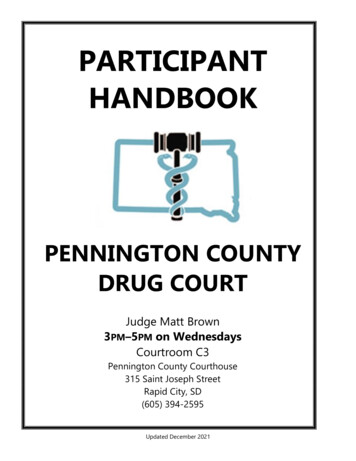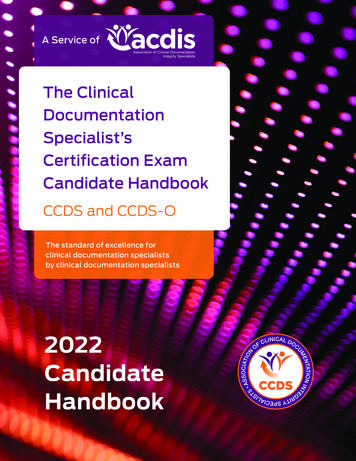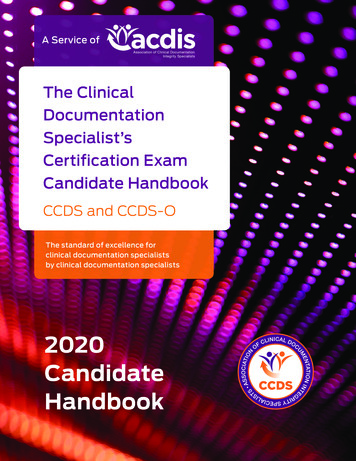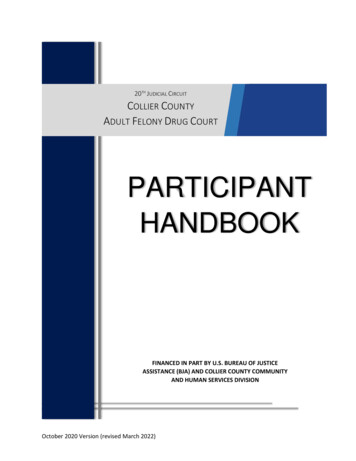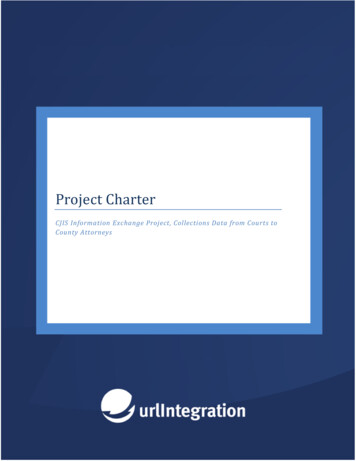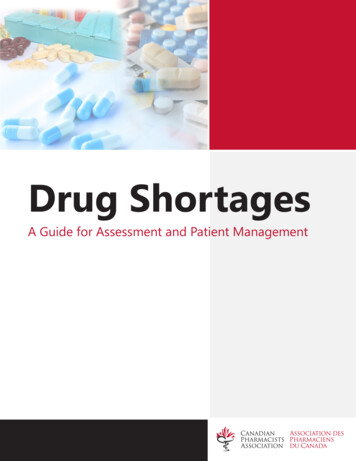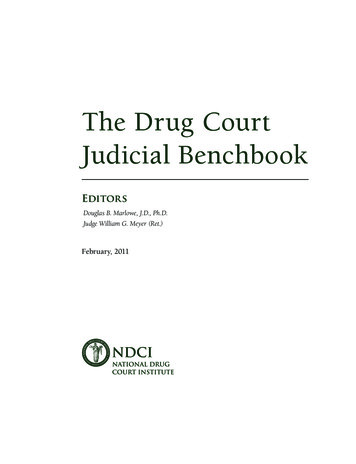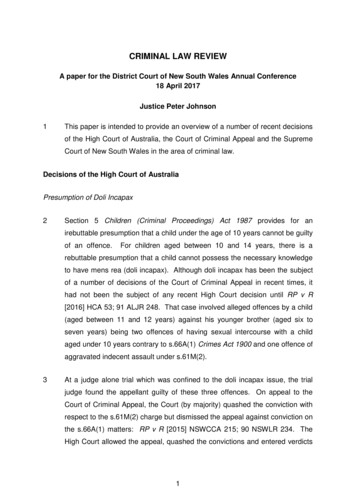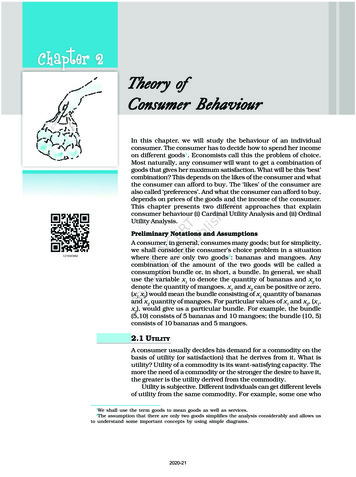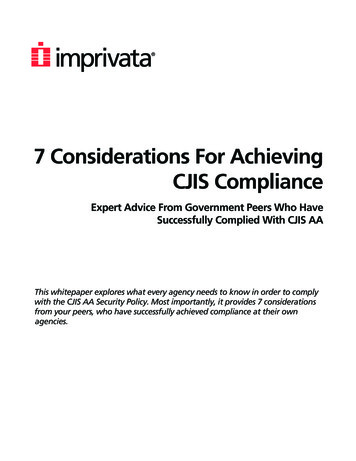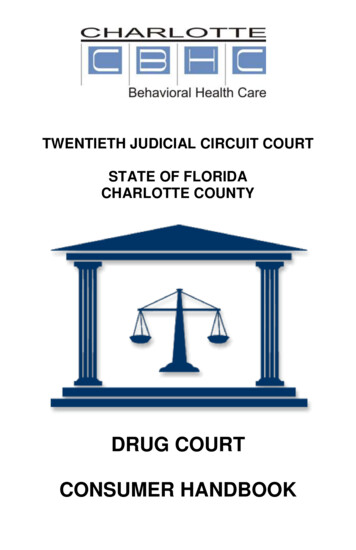
Transcription
TWENTIETH JUDICIAL CIRCUIT COURTSTATE OF FLORIDACHARLOTTE COUNTYDRUG COURTCONSUMER HANDBOOK
Revised 04/04/2017Pg. 2 of 24
TABLE OF CONTENTSINTRODUCTION TO DRUG COURT.4PROGRAM DESCRIPTION.4CHARLOTTE CO. DRUG COURT STANDARDS & REQUIREMENTS . 5DRUG COURT SUPERVISION.6DRUG COURT PROGRAM RULES . 7ABSTINENCE & RECOVERY 10PROGRAM FEES & INTAKE. 11TREATMENT PROCEDURES.11TREATMENT PLANS . 12DRUG TESTING . 12COUNSELING . 12PEER RECOVERY SUPPORT MEETINGS . . 13TREATMENT PHASES . 13SANCTIONS . 19EDUCATION, VOCATION, EMPLOYMENT PROGRAMS 19GRADUATION 20CONFIDENTIALITY . 20POLYGRAPH EXAMINATION . 21CONCLUSION . 21DRUG COURT PHONE NUMBERS . 22FACILITY EMERGENCY PLAN . 24Revised 04/04/2017Pg. 3 of 24
INTRODUCTION TO DRUG COURTYou have been arrested for a drug-related crime and, therefore, have beenidentified as a person who may have a drug problem. You are being offered anopportunity to participate in Charlotte County Drug Court. This program isdesigned to help you get off drugs and stay off drugs. If you have any specificquestions, you should consult with counsel for details.This handbook is designed to answer questions, address concerns, and provideover-all information about the Drug Court Program. As a participant, you will berequired to follow the instructions given in Drug Court by the Judge and complywith the treatment plan developed for you by your team. If there is a conflictbetween what appears in this handbook and what is ordered in Court by theJudge, the oral pronouncement of the Judge takes precedence. This handbookwill detail what is expected of you as a Drug Court participant and review generalprogram information. All participants are encouraged to share this handbook withfamily and friends.PROGRAM DESCRIPTIONThe Charlotte County Drug Court Program is a court supervised, comprehensivetreatment program for non-violent defendants. This is a voluntary program, whichincludes regular court appearances before a designated Drug Court Judge,treatment, which includes drug testing, individual/group counseling, and regularattendance at Peer Recovery Support Groups such as Narcotics Anonymous,Alcoholics Anonymous, a 12-step program, or any non-religious, nondenominational recovery support group. The Drug Court Program is a combinedeffort of the State Attorney's Office, the Public Defender's Office, the Courts, theDepartment of Corrections, and health care drug abuse services providers. Theprogram length is determined by each participant's progress and specifictreatment needs.However, in no case shall participation be less than 18months.Revised 04/04/2017Pg. 4 of 24
Following arrest, if eligible, you will be offered a choice between Drug Court andprosecution on the pending charges. The Drug Court Clinical Screener willdiscuss the Drug Court Program with you and the Public Defender or your privatecounsel will advise you. Entry into the Drug Court Program is voluntary. While inDrug Court, you will be placed on drug offender probation, requiring compliancewith specific terms and conditions, in addition to those associated with the DrugCourt Program. On your initial court date, you will be assigned a probation officerwho will provide supervision and enforcement of the terms and conditions.Probation supervision will include unannounced home visits during which yourperson and residence will be subject to search. Your defense counsel willcontinue to represent you throughout your participation in Drug Court. If you haveentered the program with private counsel and can no longer afford this expense,you may request court appointed counsel to represent you. Successfulcompletion and "graduation" from the program may result in having the chargesdismissed. Failure or discharge from the program will result in the suspendedsentence being imposed.Final determination of entry into the program shall only be made by the Judgewith recommendations from the State Attorney, defense counsel, probation, andtreatment provider.CHARLOTTE COUNTY DRUG COURT STANDARDS AND REQUIREMENTSA. A person can be eligible for Drug Court if the total sentencing points are 60points or less and he or she does not have a charge that makes them ineligiblepursuant to Fla. Stat. 948.20 and Fla. Stat. 397.344. In addition, DUI chargesare not accepted by this drug court.B. The defendant will be evaluated to determine clinical eligibility. The SAO willthen notify the court, the defendant, and defense counsel (if any), of legaleligibility for the program.The defendant will be required to sign a writtencontract, which explains all of the requirements of the program. The defendantwill be required to enter a plea, a condition of which is completion of the drugRevised 04/04/2017Pg. 5 of 24
court program. If the individual chooses to enter the drug court, they will appearbefore the Court and the Court shall impose sentence. If the defendant fails tocomplete the program, or comply with the requirements of the program, they willbe brought back before the court. Failure to complete the program upon the firstattempt may result in a violation of probation warrant being issued.DRUG COURT SUPERVISIONAs a Drug Court participant, you will be required to appear in Drug Court onregular scheduled dates. Missing a court date will result in a warrant beingissued. At each appearance, the Judge will be given a progress report preparedby the treatment provider and/or the probation officer regarding your drug testresults, attendance and participation. The Judge will ask you questions aboutyour progress, and discuss any specific problems you have been experiencing. Ifyou are doing well, you will be encouraged to continue with the program andwork with your treatment team (probation and court staff) toward success. If youare not doing well the Judge will discuss this with you and the treatment team todetermine further action. If you commit program violations; i.e. positive or missedtests, failure to attend individual or group counseling or Peer Recovery SupportGroups, failure to report to your probation officer, etc., the Court will imposesanctions (See SANCTIONS). With repeated violation of program requirements,and a failure to progress satisfactorily, the Court may impose the ultimatesanction of discharge from the program and imposition of sentence. If youentered the program by signing a Deferred Prosecution Agreement, your casewill be returned to the assigned division.Failure to appear In Court on the date and time you are scheduled will result in awarrant for your arrest and remand you to custody. If you cannot appear in Courtas scheduled, you must notify your probation officer as soon as possible toexplain why you cannot appear. If you have any questions regarding your courtappearances, you are required to contact your probation officer at (941) 5755740.Revised 04/04/2017Pg. 6 of 24
Warrants and/or new arrests could result in your being terminated from the DrugCourt Program and the imposition of any suspended sentence. Other violations,which could result in termination, include missing drug tests, demonstrating alack of program participation by failing to cooperate with treatment, and failure tofollow instructions of the probation officer. Violence or threats of violence directedat the treatment team or other clients will result in program termination. All finaldecisions regarding termination from the program will be made by the Drug CourtJudge.DRUG COURT PROGRAM RULESAs a Drug Court participant, you will be required to abide by the following rules:1. Do not use or posses any illegal drugs and/or alcohol. Do not visit any place where theprimary business is the sale of alcoholic beverages or any place where people are usingillegal drugs and/or controlled substances. Any alcoholic consumption including but notlimited to mouthwash, cold remedies, food preparations, “nonalcoholic beers”, etc. will beconsidered a relapse and will be handled accordingly. Sobriety is the primary focus of thisprogram and maintaining a drug-free lifestyle is very important in your recovery process.2. Do not use, possess, or fill prescriptions for prescription medications and/or controlledsubstances. This includes prescriptions and controlled substances that you have lawfulprescriptions for.Any substances including but not limited to controlled substances,prescription medicine, vitamin, herbal, energy, or diet supplements, inhalants, solvents,designer drugs, synthetic drugs, and over-the-counter medicines are to be approved bythe Drug Court program staff members before you will be authorized to possess or takethem. You will refrain from consumption of poppy seeds and you cannot possess orconsume any substances not meant for human consumption. You will refrain from use orpossession of any products containing ephedrine or pseudoephedrine.3. Charlotte Behavioral Health Care must be provided a paper copy of every prescriptionwritten to you, if you plan to fill it or not. You must obtain permission from the Drug Courtprogram manager prior to filling any prescription.In an emergency, if you areunsuccessful in reaching Drug Court program staff members and your probation officerand the prescription is not a controlled substance then follow doctor’s orders and informRevised 04/04/2017Pg. 7 of 24
your treatment team and probation officer immediately. Any prescriptions that have beenapproved by the Drug Court treatment team for you to take must be ingested asprescribed, i.e. by mouth only.4. Upon your admission to Drug Court you will be required to complete 90 Peer RecoverySupport Groups in 90 days. You may attend more than one meeting in a day, but youmust attend at least one meeting every day and submit proper documentation.5. You will also be required to (a) complete a minimum of 20 hours of community serviceeach week at a DOC-approved organization and provide proper documentation to yourprobation officer, or (b) work a minimum of 20 hours per week, or (c) be enrolled andattending school full time as a condition of your probation.6. Report to your Probation Officer as directed: You must be prepared to provide a urinetest at each visit. If you have any problem making an appointment, you are to call yourprobation officer.7. Attend all ordered treatment sessions: This includes individual and group counseling,educational sessions and Peer Recovery Support Groups. If you are unable to attenda scheduled session, you must contact your counselor.8. Be on time: If you are late, you may not be allowed to attend your counseling sessionand will be considered an unexcused absence, which is a violation.Contact yourassigned counselor if there is a possibility you may be late.9. You are expected to adhere to CBHC Group Expectations during the course of yourtreatment. It is very important that your behavior and language remain appropriate andcourteous at all times.10. Do not make threats toward other participants or staff or behave in a violent manner:Violent or inappropriate behavior will not be tolerated and will be reported to the Court.This will result in termination from the Drug Court Program.11. Dress appropriately for Court and treatment sessions. As a participant, you will beexpected to wear a shirt or blouse, pants, dress, skirt, and shoes worn at all times.Revised 04/04/2017Pg. 8 of 24
Clothing bearing drug or alcohol related themes; or promotion or advertising alcohol ordrug use is considered inappropriate. Sunglasses are not to be worn inside court ortreatment center unless medically approved. Speak with your treatment team if you needassistance with clothing. In consideration that your attendance may be directly after hoursof employment, jeans, uniforms or other appropriate work related dress is allowed.12. While in Court, remain seated and quiet at all times: It is very important to observeappropriate behavior in Court for the benefit of yourself and others present.13. Sexual and/or romantic relationships between Drug Court participants are notpermitted.Sexual and/or romantic relationships between Drug Court participants andMental Health Court participants are not permitted. The destructive effects on newly cleanand sober individuals and on the group process far outweigh the right of people to formnew relationships during their year in treatment. Violation of this element of the contractmay result in termination from the program.14. It is important that members use the opportunity during treatment to focus on sobriety,healthy living, and to develop safe, healthy, and honest relationships with people in theRecovery community. Thus, socializing with Drug Court and Mental Health Courtmembers outside of scheduled program activities may occur within the Recoverycommunity, in the course of developing healthy, legal and safe substance free recreationalactivities. Members will be open and honest about activities outside of treatment, takingresponsibility for their own compliance with probation and treatment expectations. Allmembers have an ethical obligation to report honestly to treatment providers andprobation their own or others’ activities which may interfere with treatment including asubstance free lifestyle.15. All interactions between Drug Court members and Mental Health Court members aresubject to the discretion of your treatment team and your probation officer.16. You will answer all questions asked of you by treatment, probation, or the Courttruthfully.17. You will follow all lawful directives of your probation officer.Revised 04/04/2017Pg. 9 of 24
18. As a treatment based program the requirements of your treatment may change fromtime to time. This is done in order to maximize your recovery. As such, you must complywith all lawful treatment orders of your probation officer, the treatment team, and theCourt.ABSTINENCE AND RECOVERYDrug Court requires that individuals remain substance-free while participating inthe program. Unapproved use of unapproved substances while in the programmay result in dismissal from the program or a modification of your contract, orsometimes a sanction as determined by the Drug Court treatment team and theJudge.To that end, Charlotte Behavioral Health Care commits to make every effort toprescribe substances that are not controlled for individuals recovering or inremission from a substance abuse problem or addiction.Possession ofcontrolled substances or use of unapproved substances while in the program willrequire staffing with and approval from the Chief Medical Officer/Medical Directorand the Drug Court Program Manager.Drug Court participants receiving medication or treatment from other medicalproviders in the community, including but not limited to, Pain ManagementSpecialist, Dentists, or their Primary Care Provider (PCP) will be required to signreleases of information, so that Charlotte Behavioral Health Care may be directlyin contact with the provider. Charlotte Behavioral Health Care will contact themedical provider via phone or letter to inform the provider of the participant’saddiction issues and discuss treatment alternatives.Drug Court staff will provide education to participants about the risks inherent inuse of controlled substances.Drug Court participants’ continued use of prescribed controlled substances thatinterferes with their ongoing recovery or poses a risk to the participant and/orRevised 04/04/2017Pg. 10 of 24
community may result in a possible sanction at the discretion of the Drug CourtJudge or dismissal from the program and subsequent legal action.PROGRAM FEES & INTAKEAs a participant on formal probation, you may be required to pay the cost ofprobation supervision. A probation officer will instruct you on your court orderedmonetary obligations, a payment plan, and how to make payments. You will berequired to make regular treatment payments to Charlotte Behavioral HealthCare to the total of 2,340 over the course of 18 months. Participation in excessof 18 months will be charged an additional 30 per week until graduation.Regular payments towards your treatment are expected. When applicable, wealso accept private insurances, Medicaid, and Medicare. Co-payments areexpected at the time of service. We accept cash, personal checks, moneyorders, and Visa or MasterCard.Upon admission to Charlotte Behavioral Health Care, you will first meet with oneof our intake personnel who will review intake paperwork and set you up in oursystem.You will be asked to provide necessary demographic and financialinformation at this time. Please be prepared to provide necessary paperwork.You will then meet with Drug Court staff and a comprehensive assessment willbe conducted. During the assessment, you will be asked to provide informationabout your symptoms, substance use, treatment history, and other relevanttopics. We ask that you be open and honest during this assessment process.After your assessment, you will be given an orientation and overview of the DrugCourt program. Please anticipate this initial appointment to last at least 3 hours.TREATMENT PROCEDURESYour treatment will be provided through a team approach with the combinedresources of the probation office and the assigned drug treatment staff. Thetreatment team will assess what level of treatment will best meet your needs andrecommend to the Drug Court Judge that you receive outpatient or residentialtreatment. If you are admitted to a residential treatment program, your treatmentplan will include the requirements of that program. If you are not admitted into aRevised 04/04/2017Pg. 11 of 24
residential treatment program, a multi-component, outpatient program has beendeveloped which includes: group therapy, individual therapy, family therapy,monitored drug testing, life skills, and service coordination.TREATMENT PLANSAn "initial" treatment plan will be developed by you and your treatment teamfollowing an over-all assessment of your problems and needs. The plan will actas a guide for your initial treatment phase and within it, you will set goals, selectmethods for meeting those goals, and develop target dates for achieving thosegoals. The plan will be maintained by your treatment team and will be updated asyou progress through the program.During the course of your treatment, the treatment team may determine that yourspecific needs may be better suited for supervision in the Mental Health CourtProgram. If this situation arises, you may be transferred from the Drug CourtProgram to the Mental Health Court Program.DRUG TESTINGYou will be drug tested through the entire treatment process. You will be tested aminimum of one time per week. The Drug Court Judge will have access to alldrug test results including any failures to test, and may order a drug test at anytime. Tampering with the drug/urine test will be deemed a positive test and mayresult in your expulsion from the program (this includes flushing, diluting, usingsomeone else’s urine, using any devices, etc.) A positive or "dirty" test will notautomatically disqualify you from the Drug Court Program. The Judge will bereviewing your overall performance in the program.COUNSELINGSubstance abuse counseling comprises two separate formats: individual andgroup. As part of your treatment plan, you will be required to participate in bothtypes of counseling. Together they are designed to develop self-awareness,realize self-worth, and develop the strength to practice self-discipline. TheRevised 04/04/2017Pg. 12 of 24
individual and group counseling sessions will include problem identification andalternative solutions. Your attendance at counseling sessions is reported to theJudge as part of your progress report. You must have prior permission from yourcounselor to be excused from a counseling session (acceptable reason forabsence - hospitalization; documentation from the hospital will be required).PEER RECOVERY SUPPORT GROUPSAttendance will be required at Peer Recovery Support Groups such as but notlimited to Narcotics Anonymous, Alcoholics Anonymous, Cocaine Anonymous,Celebrate Recovery, and/or any non-religious based alcohol/narcotics recoverysupport group. The frequency of attendance requirement will be determined byyour progress in the program and your phase level. Attendance is an importantpart of your recovery process to help you develop levels of trust, and to earn andcreate social bonds with other recovering addicts. Your treatment team willprovide you with information regarding the time and location of Peer RecoverySupport Groups and will direct you to special interest and recovery events in thecommunity. You must provide proof of attendance to the court probation officer ateach court appearance. Your counselor may also require you to provide proof ofattendance on a weekly basis.TREATMENT PHASESThe Drug Court Treatment Program is a six-phase, highly structured, treatmentprogram lasting for a minimum of eighteen (18) months, depending upon yourindividual progress. Each phase consists of specified treatment ndspecificrequirementsforadvancement into the next phase. The primary focus of the program is treatment;as such, you will be required to comply with all treatment recommendations ofthe Drug Court treatment counselor, probation officer, or the Court. This mayinclude a change in treatment requirements including a requirement tosuccessfully enroll in and complete a residential treatment program. By agreeingto enter the Drug Court Program, you are agreeing to the alteration of yourtreatment requirements as needed, as a condition of your probation, and areRevised 04/04/2017Pg. 13 of 24
waiving any jurisdictional objections to the Court imposing these alteredtreatment requirements.The components and requirements of advancementfrom each phase are described below:ORIENTATION PHASEIn the Orientation Phase, you will be assigned to a probation officer and a drugtreatment counselor. They will comprise your treatment team and will provide youwith an orientation/overview of the Drug Court Program. Your problems andneeds will be assessed and a treatment plan will be developed. Orientationrequirements include:1. Orientation and Overview of Program2. Assessment and Initial Treatment Plan Development3. Drug Testing (four urinalysis tests per week minimum)4. Recreation/Fellowship5. Daily Attendance at Peer Recovery Support Groups (90 meetings in 90 days)6. Four Group Therapy Sessions, weekly7. Individual sessions as recommended by your primary Therapist, (Min. 2 per month)7. Report to the Probation Officer (monthly or as instructed by probation officer)8. Formulate Personal Program Goals in Conjunction with the Treatment Team9. Weekly Court Appearance as Determined by the Drug Court Judge.ADVANCEMENT CRITERIA TO PHASE ONE, INCLUDING BUT NOT LIMITEDTO: All sanctions must have been completed for 30 consecutive days after last day ofmost recent sanction Documented attendance at required treatment sessions, including Peer RecoverySupport Groups, individual/case management sessions, and group therapy sessions Employed, currently involved in vocational/educational setting, or performingcommunity service at a minimum of 20 hours per week is encouraged. Completion of any and all Treatment Recommendations which may includeevaluation for medication management, anger management, trauma, and/or parentingclasses. Must obtain a sponsor from Peer Recovery Support Group Meetings.Revised 04/04/2017Pg. 14 of 24
PHASE I – ONGOING ASSESSMENT AND TREATMENTIn Phase I, your counselor will continue to monitor your progress and make anychanges to your assessment and treatment plan as needed.Phase Irequirements include:1. Drug Testing (four urinalysis tests per week minimum)2. Recreation/Fellowship3. Regular Attendance at Peer Recovery Support Groups (continue with 90 meetings in 90days, followed by a minimum of 4 meetings per week upon completion of 90/90)4. Four Group Therapy Sessions, weekly5. Individual sessions as recommended by your primary Therapist, (Min. of 2 times permonth).6. Report to Probation Officer (monthly or as instructed by probation officer)7. Other Case Management Services as Determined by the Treatment Team8. Weekly Court Appearance as Determined by the Drug Court Judge9. Must have enrolled in Foundations For Success through your Probation Officer10. Full-time employment (minimum 20 hours per week), or full-time student. If notemployed or not a full time student you shall perform a minimum of 20 community serviceshours per week.11. If you are not employed full time or are not a full time student then you will activelyengage in seeking full-time employment. Actively seeking full-time employment requires aminimum of 14 job searches per week until full-time employment is obtained.ADVANCEMENT CRITERIA TO PHASE TWO, INCLUDING BUT NOT LIMITEDTO:1. All sanctions must have been completed for 60 consecutive days after last day of mostrecent sanction.2. Documented attendance at required treatment sessions, including Peer RecoverySupport Groups, individual/case management sessions, and group therapy sessions.3. Employed at least 20 hours per week, currently involved in vocational/educationalsetting, or performing community service at a minimum of 20 hours per week, if notemployed must submit 14 job searches per week to probation.4. Compliance with Treatment Recommendations including recovery work as provided byPrimary Therapist.5. Must write and present on their personal addiction and recovery history.Revised 04/04/2017Pg. 15 of 24
PHASE II - ONGOING TREATMENT/SKILL BUILDINGIn Phase II, your treatment plan will be updated by you and your counselor toidentify your treatment goals and objectives. Counseling and meetings will focuson building skills for long-lasting recovery. Phase II requirements include:1.Three group therapy sessions weekly2.Individual sessions as recommended by your primary Therapist3.Report to the probation officer as instructed4.Ongoing review and updating of treatment plan5.Drug testing (three urinalysis tests weekly - minimum)6.Regular attendance at Peer Recovery Support Groups (minimum of 4 per week)7.Recreation/fellowship8.Other case management services as determined by the treatment team9.Biweekly court appearances as determined by the Drug Court Judge10. Client identified life goals: Maintain full-time employment or full-time student, in theabsence of full-time employment or full time student status shall actively engage in aminimum of 14 job searches per week until full-time employment is obtained, andshall complete a minimum of 20 community service hours per week.ADVANCEMENT CRITERIA TO PHASE THREE, INCLUDING BUT NOTLIMITED TO: All sanctions must have been completed for 90 consecutive days after last day ofmost recent sanction Documented attendance at required treatment sessions, including Peer RecoverySupport Groups, individual/case management sessions, and group therapy sessions Employed at least 20 hours per week,, currently involved in vocational/educationalsetting, or performing community service at a minimum of 20 hours per week Must present on a recovery related topic as approved by Treatment Team in a groupsessionPHASE III – ONGOING TREATMENT/RELAPSE PREVENTION1. Two group therapy sessions weekly2. Individual sessions as recommended by your primary Therapist3. Report to probation officer as instructed4. Drug Testing (two urinalysis tests weekly minimum)Revised 04/04/2017Pg. 16 of 24
5. Regular attendance at Peer Recovery Support Groups (minimum of 4 per week)6. Recreation/fellowship7. Other case management services as determined by the treatment team8. Court appearances every three weeks as determined by the Drug Court Judge9. Maintain full-time employment or full-time student, in the absence of full-timeemployment or full time student status shall actively engage in a minimum of 14 jobsearches per week until full-time employment is obtained, and shall complete a minimumof 20 community service hours per week.ADVANCEMENT CRITERIA TO PHASE FOUR, INCLUDING BUT NOT LIMITED TO:1. All sanctions must have been completed for 90 consecutive days after last day of mostrecent sanction2. Documented attendance at required treatment sessions, including Peer RecoverySupport Groups, individual/case management session, and group therapy sessions3. Review of the progress made toward Client identified life goal4. Must present completed relapse prevention plan to Treatment Team5. Must complete a polygraph examinationPHASE IV - ACHIEVEMENT/GRADUATION/MENTORINGPhase IV will address your ongoing recovery needs including maintaining totalabstinence from all drugs. The focus will be on daily living skills. This phase isdesigned to support you in your return to the community as a productive andresponsible member. Phase IV requirements include:1.A minimum of one (1) group therapy session weekly2.Individual sessions as recommended by your primary Therapist3.Report to the probation officer as instructed4.Ongoing review and update of treatment plan5.Drug testing (one urinalysis test weekly – minimum)6.Regular attendance at Peer Recovery Support Groups (at least three per week)7.Recreation/fellowship8.Other case management services as determined necessary by the treatment team9.Monthly court appearances as determined by the Drug Court JudgeRevised 04/04/2017Pg. 17 of 24 pag
This handbook is designed to answer questions, address concerns, and provide over-all information about the Drug Court Program. As a participant, you will be . Drug Court, you will be placed on drug offender probation, requiring compliance with specific terms and conditions, in additi
